Analysis of Leadership Theories and Business Sustainability Essay
VerifiedAdded on 2022/11/18
|9
|1867
|108
Essay
AI Summary
This essay examines the critical role of leadership in modern business, emphasizing its impact on organizational strategy, employee relations, and overall sustainability. It explores the significance of leadership in navigating the complexities of the business market. The essay focuses on the democratic leadership theory, also known as participative management, and analyzes its attributes and benefits. It highlights how democratic leadership, by valuing employee input and fostering open communication, enhances job satisfaction, reduces employee turnover, and improves organizational culture. The essay argues that this leadership style is crucial for managing human resource issues and creating a positive work environment. The benefits of the democratic leadership theory in conflict management and improving corporate culture are also discussed. The essay concludes by underscoring the importance of effective leadership in achieving sustainable business operations and competitive advantage.
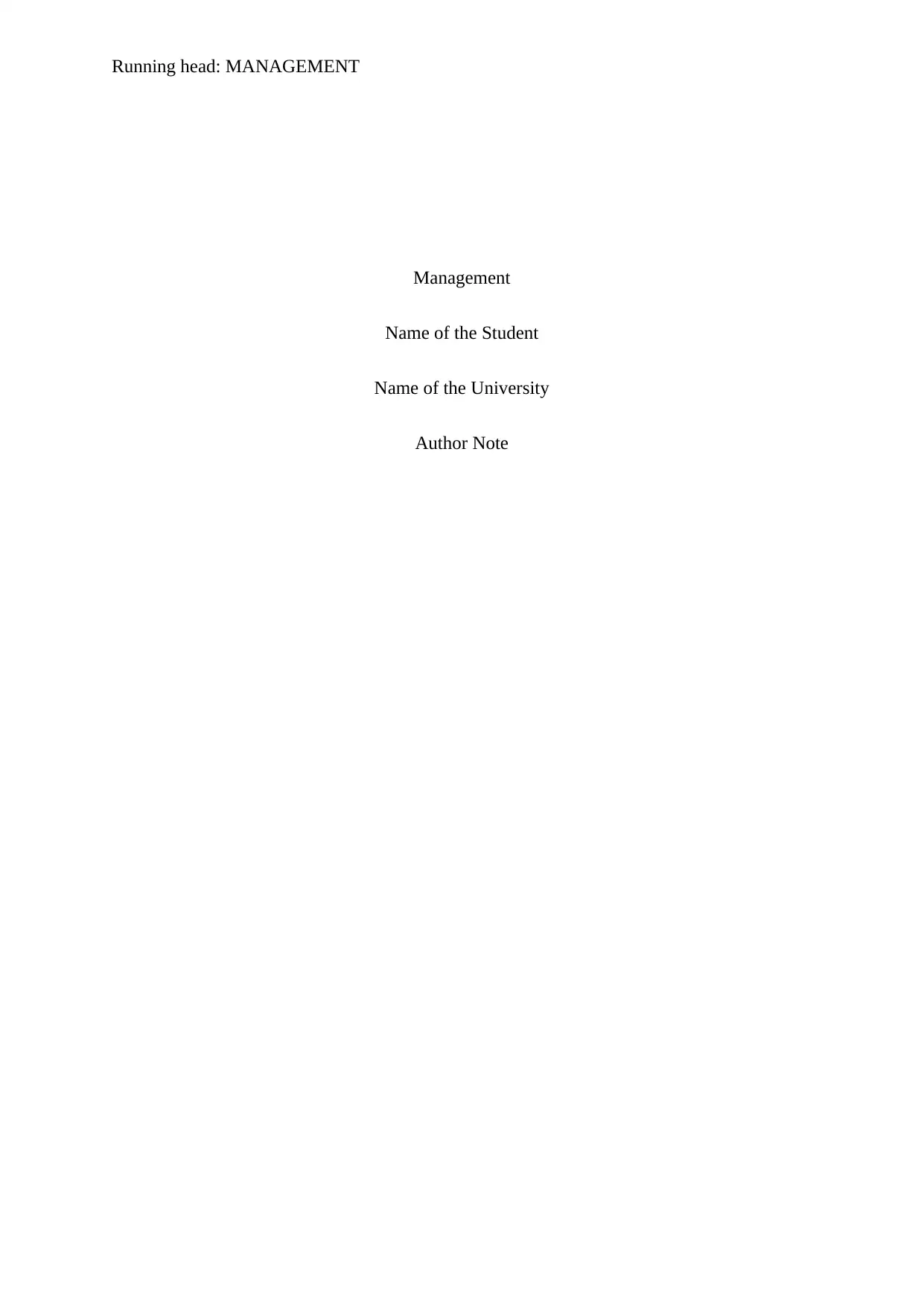
Running head: MANAGEMENT
Management
Name of the Student
Name of the University
Author Note
Management
Name of the Student
Name of the University
Author Note
Paraphrase This Document
Need a fresh take? Get an instant paraphrase of this document with our AI Paraphraser
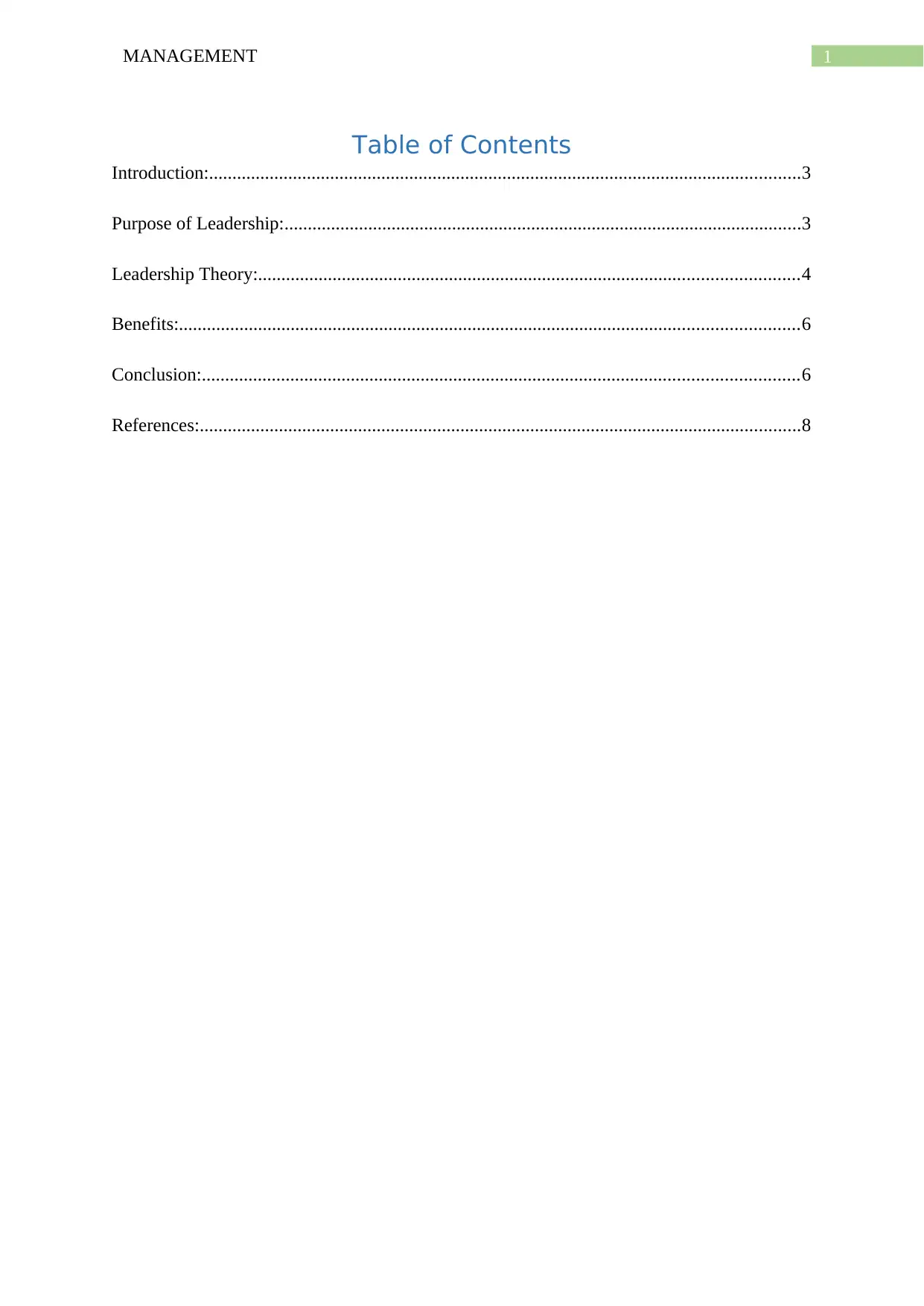
1MANAGEMENT
Table of Contents
Introduction:...............................................................................................................................3
Purpose of Leadership:...............................................................................................................3
Leadership Theory:....................................................................................................................4
Benefits:.....................................................................................................................................6
Conclusion:................................................................................................................................6
References:.................................................................................................................................8
Table of Contents
Introduction:...............................................................................................................................3
Purpose of Leadership:...............................................................................................................3
Leadership Theory:....................................................................................................................4
Benefits:.....................................................................................................................................6
Conclusion:................................................................................................................................6
References:.................................................................................................................................8
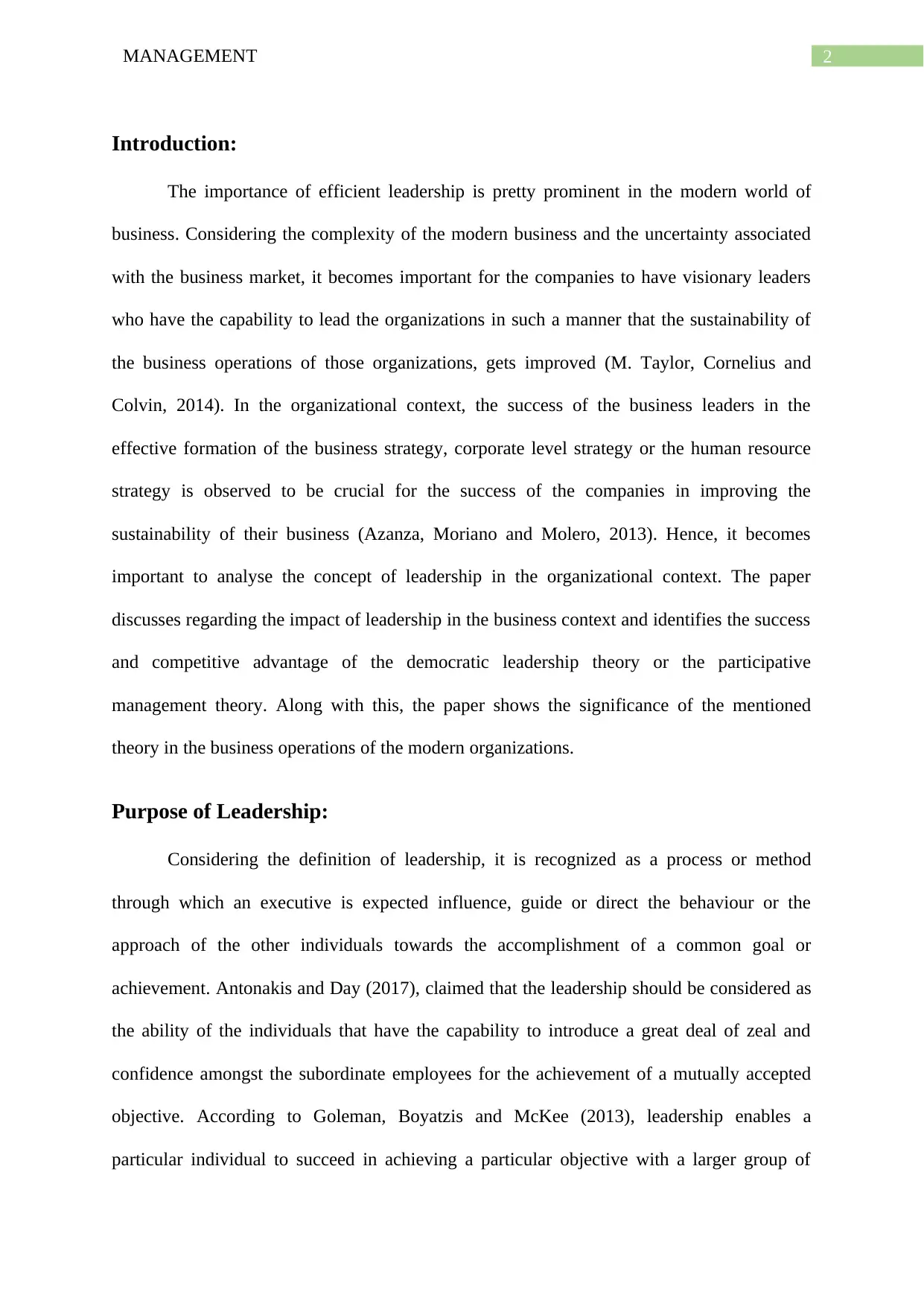
2MANAGEMENT
Introduction:
The importance of efficient leadership is pretty prominent in the modern world of
business. Considering the complexity of the modern business and the uncertainty associated
with the business market, it becomes important for the companies to have visionary leaders
who have the capability to lead the organizations in such a manner that the sustainability of
the business operations of those organizations, gets improved (M. Taylor, Cornelius and
Colvin, 2014). In the organizational context, the success of the business leaders in the
effective formation of the business strategy, corporate level strategy or the human resource
strategy is observed to be crucial for the success of the companies in improving the
sustainability of their business (Azanza, Moriano and Molero, 2013). Hence, it becomes
important to analyse the concept of leadership in the organizational context. The paper
discusses regarding the impact of leadership in the business context and identifies the success
and competitive advantage of the democratic leadership theory or the participative
management theory. Along with this, the paper shows the significance of the mentioned
theory in the business operations of the modern organizations.
Purpose of Leadership:
Considering the definition of leadership, it is recognized as a process or method
through which an executive is expected influence, guide or direct the behaviour or the
approach of the other individuals towards the accomplishment of a common goal or
achievement. Antonakis and Day (2017), claimed that the leadership should be considered as
the ability of the individuals that have the capability to introduce a great deal of zeal and
confidence amongst the subordinate employees for the achievement of a mutually accepted
objective. According to Goleman, Boyatzis and McKee (2013), leadership enables a
particular individual to succeed in achieving a particular objective with a larger group of
Introduction:
The importance of efficient leadership is pretty prominent in the modern world of
business. Considering the complexity of the modern business and the uncertainty associated
with the business market, it becomes important for the companies to have visionary leaders
who have the capability to lead the organizations in such a manner that the sustainability of
the business operations of those organizations, gets improved (M. Taylor, Cornelius and
Colvin, 2014). In the organizational context, the success of the business leaders in the
effective formation of the business strategy, corporate level strategy or the human resource
strategy is observed to be crucial for the success of the companies in improving the
sustainability of their business (Azanza, Moriano and Molero, 2013). Hence, it becomes
important to analyse the concept of leadership in the organizational context. The paper
discusses regarding the impact of leadership in the business context and identifies the success
and competitive advantage of the democratic leadership theory or the participative
management theory. Along with this, the paper shows the significance of the mentioned
theory in the business operations of the modern organizations.
Purpose of Leadership:
Considering the definition of leadership, it is recognized as a process or method
through which an executive is expected influence, guide or direct the behaviour or the
approach of the other individuals towards the accomplishment of a common goal or
achievement. Antonakis and Day (2017), claimed that the leadership should be considered as
the ability of the individuals that have the capability to introduce a great deal of zeal and
confidence amongst the subordinate employees for the achievement of a mutually accepted
objective. According to Goleman, Boyatzis and McKee (2013), leadership enables a
particular individual to succeed in achieving a particular objective with a larger group of
⊘ This is a preview!⊘
Do you want full access?
Subscribe today to unlock all pages.

Trusted by 1+ million students worldwide
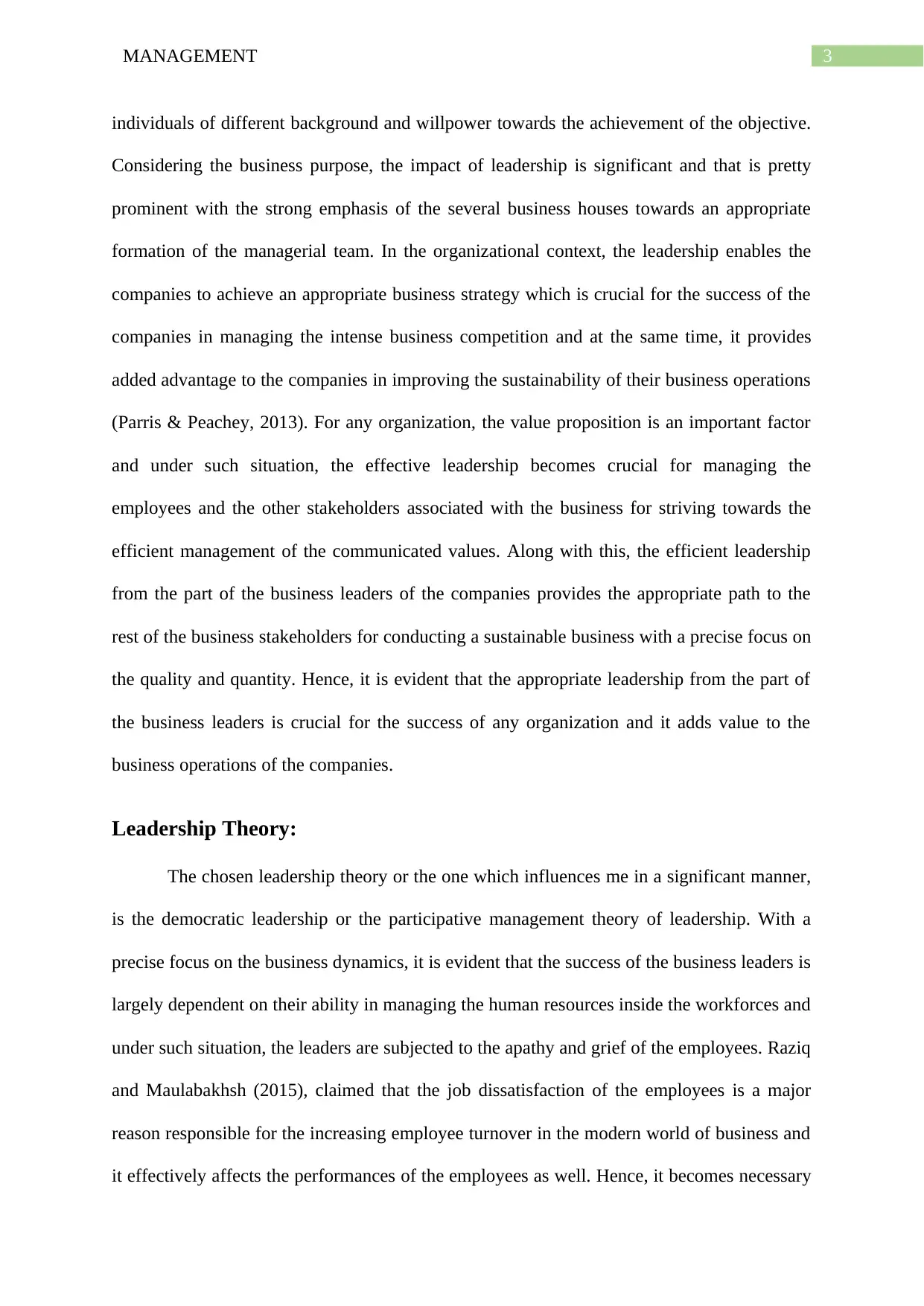
3MANAGEMENT
individuals of different background and willpower towards the achievement of the objective.
Considering the business purpose, the impact of leadership is significant and that is pretty
prominent with the strong emphasis of the several business houses towards an appropriate
formation of the managerial team. In the organizational context, the leadership enables the
companies to achieve an appropriate business strategy which is crucial for the success of the
companies in managing the intense business competition and at the same time, it provides
added advantage to the companies in improving the sustainability of their business operations
(Parris & Peachey, 2013). For any organization, the value proposition is an important factor
and under such situation, the effective leadership becomes crucial for managing the
employees and the other stakeholders associated with the business for striving towards the
efficient management of the communicated values. Along with this, the efficient leadership
from the part of the business leaders of the companies provides the appropriate path to the
rest of the business stakeholders for conducting a sustainable business with a precise focus on
the quality and quantity. Hence, it is evident that the appropriate leadership from the part of
the business leaders is crucial for the success of any organization and it adds value to the
business operations of the companies.
Leadership Theory:
The chosen leadership theory or the one which influences me in a significant manner,
is the democratic leadership or the participative management theory of leadership. With a
precise focus on the business dynamics, it is evident that the success of the business leaders is
largely dependent on their ability in managing the human resources inside the workforces and
under such situation, the leaders are subjected to the apathy and grief of the employees. Raziq
and Maulabakhsh (2015), claimed that the job dissatisfaction of the employees is a major
reason responsible for the increasing employee turnover in the modern world of business and
it effectively affects the performances of the employees as well. Hence, it becomes necessary
individuals of different background and willpower towards the achievement of the objective.
Considering the business purpose, the impact of leadership is significant and that is pretty
prominent with the strong emphasis of the several business houses towards an appropriate
formation of the managerial team. In the organizational context, the leadership enables the
companies to achieve an appropriate business strategy which is crucial for the success of the
companies in managing the intense business competition and at the same time, it provides
added advantage to the companies in improving the sustainability of their business operations
(Parris & Peachey, 2013). For any organization, the value proposition is an important factor
and under such situation, the effective leadership becomes crucial for managing the
employees and the other stakeholders associated with the business for striving towards the
efficient management of the communicated values. Along with this, the efficient leadership
from the part of the business leaders of the companies provides the appropriate path to the
rest of the business stakeholders for conducting a sustainable business with a precise focus on
the quality and quantity. Hence, it is evident that the appropriate leadership from the part of
the business leaders is crucial for the success of any organization and it adds value to the
business operations of the companies.
Leadership Theory:
The chosen leadership theory or the one which influences me in a significant manner,
is the democratic leadership or the participative management theory of leadership. With a
precise focus on the business dynamics, it is evident that the success of the business leaders is
largely dependent on their ability in managing the human resources inside the workforces and
under such situation, the leaders are subjected to the apathy and grief of the employees. Raziq
and Maulabakhsh (2015), claimed that the job dissatisfaction of the employees is a major
reason responsible for the increasing employee turnover in the modern world of business and
it effectively affects the performances of the employees as well. Hence, it becomes necessary
Paraphrase This Document
Need a fresh take? Get an instant paraphrase of this document with our AI Paraphraser
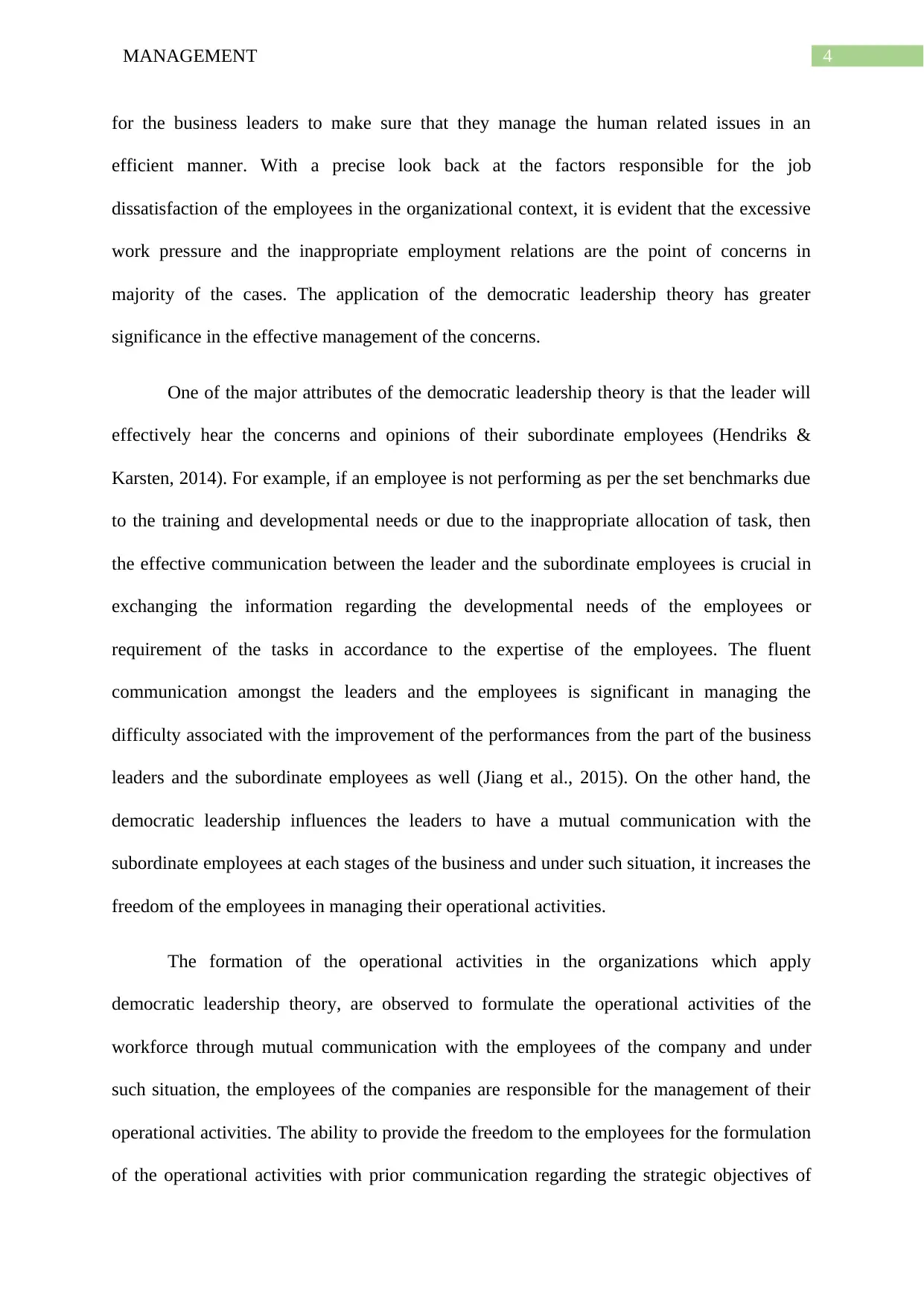
4MANAGEMENT
for the business leaders to make sure that they manage the human related issues in an
efficient manner. With a precise look back at the factors responsible for the job
dissatisfaction of the employees in the organizational context, it is evident that the excessive
work pressure and the inappropriate employment relations are the point of concerns in
majority of the cases. The application of the democratic leadership theory has greater
significance in the effective management of the concerns.
One of the major attributes of the democratic leadership theory is that the leader will
effectively hear the concerns and opinions of their subordinate employees (Hendriks &
Karsten, 2014). For example, if an employee is not performing as per the set benchmarks due
to the training and developmental needs or due to the inappropriate allocation of task, then
the effective communication between the leader and the subordinate employees is crucial in
exchanging the information regarding the developmental needs of the employees or
requirement of the tasks in accordance to the expertise of the employees. The fluent
communication amongst the leaders and the employees is significant in managing the
difficulty associated with the improvement of the performances from the part of the business
leaders and the subordinate employees as well (Jiang et al., 2015). On the other hand, the
democratic leadership influences the leaders to have a mutual communication with the
subordinate employees at each stages of the business and under such situation, it increases the
freedom of the employees in managing their operational activities.
The formation of the operational activities in the organizations which apply
democratic leadership theory, are observed to formulate the operational activities of the
workforce through mutual communication with the employees of the company and under
such situation, the employees of the companies are responsible for the management of their
operational activities. The ability to provide the freedom to the employees for the formulation
of the operational activities with prior communication regarding the strategic objectives of
for the business leaders to make sure that they manage the human related issues in an
efficient manner. With a precise look back at the factors responsible for the job
dissatisfaction of the employees in the organizational context, it is evident that the excessive
work pressure and the inappropriate employment relations are the point of concerns in
majority of the cases. The application of the democratic leadership theory has greater
significance in the effective management of the concerns.
One of the major attributes of the democratic leadership theory is that the leader will
effectively hear the concerns and opinions of their subordinate employees (Hendriks &
Karsten, 2014). For example, if an employee is not performing as per the set benchmarks due
to the training and developmental needs or due to the inappropriate allocation of task, then
the effective communication between the leader and the subordinate employees is crucial in
exchanging the information regarding the developmental needs of the employees or
requirement of the tasks in accordance to the expertise of the employees. The fluent
communication amongst the leaders and the employees is significant in managing the
difficulty associated with the improvement of the performances from the part of the business
leaders and the subordinate employees as well (Jiang et al., 2015). On the other hand, the
democratic leadership influences the leaders to have a mutual communication with the
subordinate employees at each stages of the business and under such situation, it increases the
freedom of the employees in managing their operational activities.
The formation of the operational activities in the organizations which apply
democratic leadership theory, are observed to formulate the operational activities of the
workforce through mutual communication with the employees of the company and under
such situation, the employees of the companies are responsible for the management of their
operational activities. The ability to provide the freedom to the employees for the formulation
of the operational activities with prior communication regarding the strategic objectives of
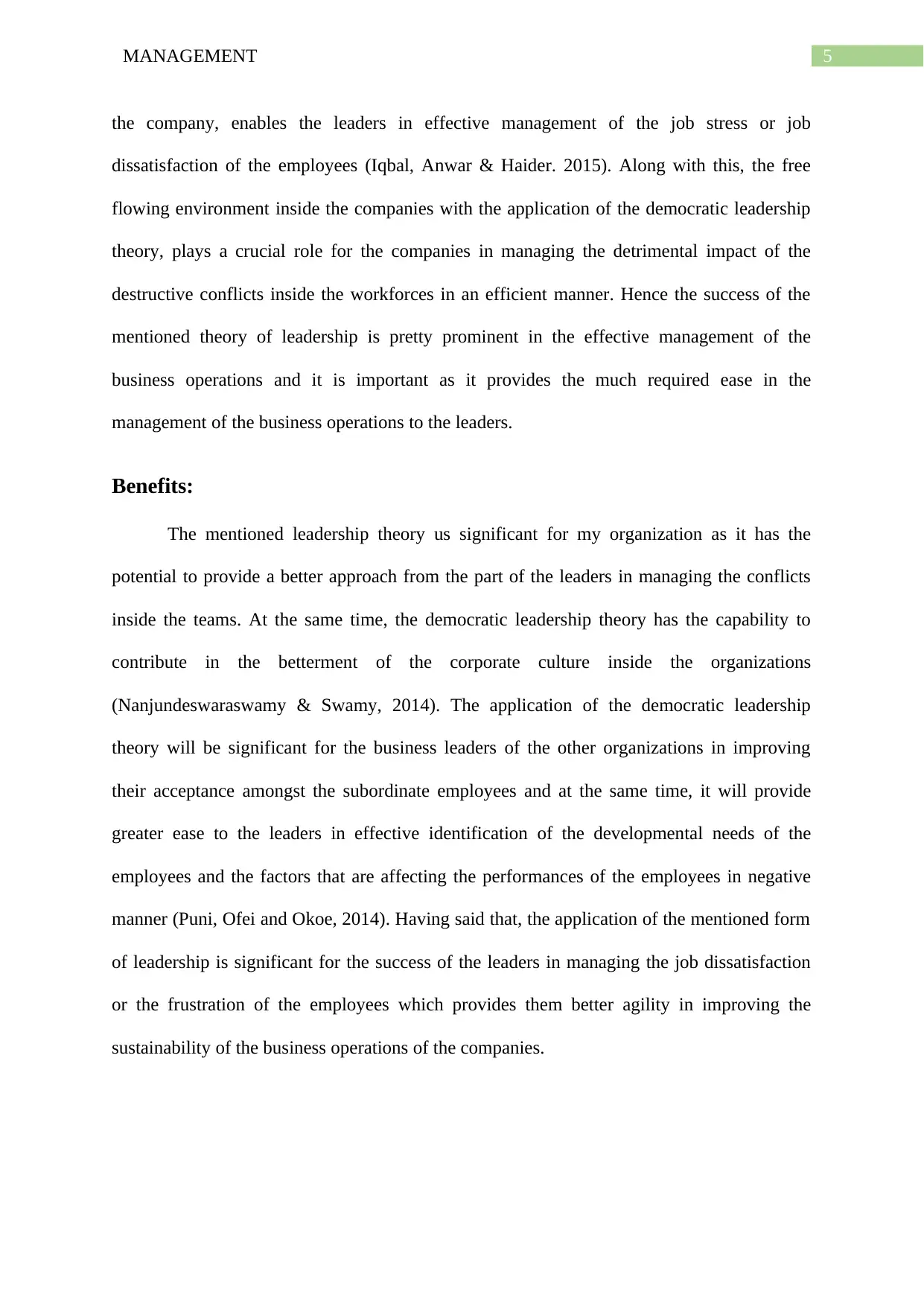
5MANAGEMENT
the company, enables the leaders in effective management of the job stress or job
dissatisfaction of the employees (Iqbal, Anwar & Haider. 2015). Along with this, the free
flowing environment inside the companies with the application of the democratic leadership
theory, plays a crucial role for the companies in managing the detrimental impact of the
destructive conflicts inside the workforces in an efficient manner. Hence the success of the
mentioned theory of leadership is pretty prominent in the effective management of the
business operations and it is important as it provides the much required ease in the
management of the business operations to the leaders.
Benefits:
The mentioned leadership theory us significant for my organization as it has the
potential to provide a better approach from the part of the leaders in managing the conflicts
inside the teams. At the same time, the democratic leadership theory has the capability to
contribute in the betterment of the corporate culture inside the organizations
(Nanjundeswaraswamy & Swamy, 2014). The application of the democratic leadership
theory will be significant for the business leaders of the other organizations in improving
their acceptance amongst the subordinate employees and at the same time, it will provide
greater ease to the leaders in effective identification of the developmental needs of the
employees and the factors that are affecting the performances of the employees in negative
manner (Puni, Ofei and Okoe, 2014). Having said that, the application of the mentioned form
of leadership is significant for the success of the leaders in managing the job dissatisfaction
or the frustration of the employees which provides them better agility in improving the
sustainability of the business operations of the companies.
the company, enables the leaders in effective management of the job stress or job
dissatisfaction of the employees (Iqbal, Anwar & Haider. 2015). Along with this, the free
flowing environment inside the companies with the application of the democratic leadership
theory, plays a crucial role for the companies in managing the detrimental impact of the
destructive conflicts inside the workforces in an efficient manner. Hence the success of the
mentioned theory of leadership is pretty prominent in the effective management of the
business operations and it is important as it provides the much required ease in the
management of the business operations to the leaders.
Benefits:
The mentioned leadership theory us significant for my organization as it has the
potential to provide a better approach from the part of the leaders in managing the conflicts
inside the teams. At the same time, the democratic leadership theory has the capability to
contribute in the betterment of the corporate culture inside the organizations
(Nanjundeswaraswamy & Swamy, 2014). The application of the democratic leadership
theory will be significant for the business leaders of the other organizations in improving
their acceptance amongst the subordinate employees and at the same time, it will provide
greater ease to the leaders in effective identification of the developmental needs of the
employees and the factors that are affecting the performances of the employees in negative
manner (Puni, Ofei and Okoe, 2014). Having said that, the application of the mentioned form
of leadership is significant for the success of the leaders in managing the job dissatisfaction
or the frustration of the employees which provides them better agility in improving the
sustainability of the business operations of the companies.
⊘ This is a preview!⊘
Do you want full access?
Subscribe today to unlock all pages.

Trusted by 1+ million students worldwide
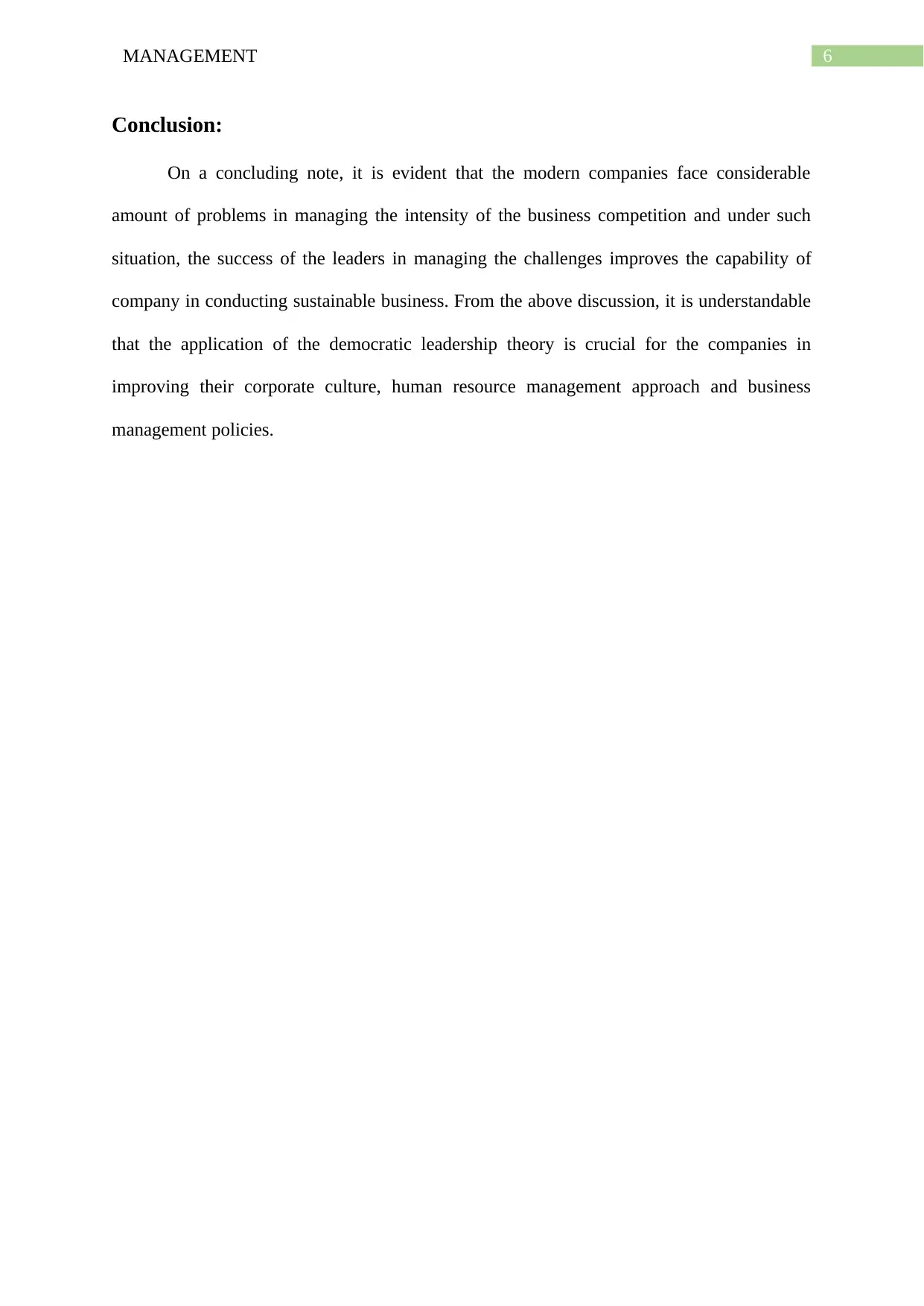
6MANAGEMENT
Conclusion:
On a concluding note, it is evident that the modern companies face considerable
amount of problems in managing the intensity of the business competition and under such
situation, the success of the leaders in managing the challenges improves the capability of
company in conducting sustainable business. From the above discussion, it is understandable
that the application of the democratic leadership theory is crucial for the companies in
improving their corporate culture, human resource management approach and business
management policies.
Conclusion:
On a concluding note, it is evident that the modern companies face considerable
amount of problems in managing the intensity of the business competition and under such
situation, the success of the leaders in managing the challenges improves the capability of
company in conducting sustainable business. From the above discussion, it is understandable
that the application of the democratic leadership theory is crucial for the companies in
improving their corporate culture, human resource management approach and business
management policies.
Paraphrase This Document
Need a fresh take? Get an instant paraphrase of this document with our AI Paraphraser
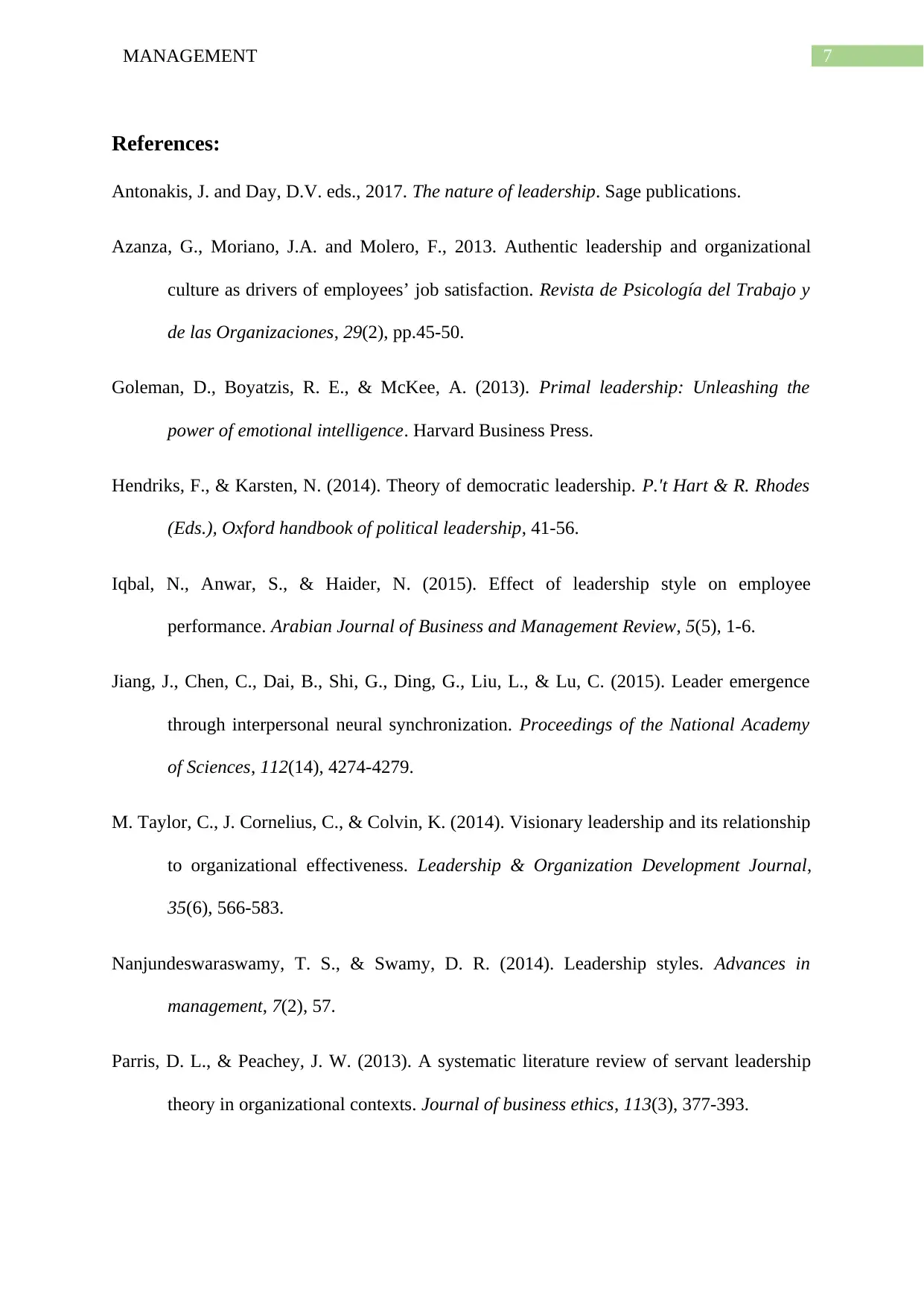
7MANAGEMENT
References:
Antonakis, J. and Day, D.V. eds., 2017. The nature of leadership. Sage publications.
Azanza, G., Moriano, J.A. and Molero, F., 2013. Authentic leadership and organizational
culture as drivers of employees’ job satisfaction. Revista de Psicología del Trabajo y
de las Organizaciones, 29(2), pp.45-50.
Goleman, D., Boyatzis, R. E., & McKee, A. (2013). Primal leadership: Unleashing the
power of emotional intelligence. Harvard Business Press.
Hendriks, F., & Karsten, N. (2014). Theory of democratic leadership. P.'t Hart & R. Rhodes
(Eds.), Oxford handbook of political leadership, 41-56.
Iqbal, N., Anwar, S., & Haider, N. (2015). Effect of leadership style on employee
performance. Arabian Journal of Business and Management Review, 5(5), 1-6.
Jiang, J., Chen, C., Dai, B., Shi, G., Ding, G., Liu, L., & Lu, C. (2015). Leader emergence
through interpersonal neural synchronization. Proceedings of the National Academy
of Sciences, 112(14), 4274-4279.
M. Taylor, C., J. Cornelius, C., & Colvin, K. (2014). Visionary leadership and its relationship
to organizational effectiveness. Leadership & Organization Development Journal,
35(6), 566-583.
Nanjundeswaraswamy, T. S., & Swamy, D. R. (2014). Leadership styles. Advances in
management, 7(2), 57.
Parris, D. L., & Peachey, J. W. (2013). A systematic literature review of servant leadership
theory in organizational contexts. Journal of business ethics, 113(3), 377-393.
References:
Antonakis, J. and Day, D.V. eds., 2017. The nature of leadership. Sage publications.
Azanza, G., Moriano, J.A. and Molero, F., 2013. Authentic leadership and organizational
culture as drivers of employees’ job satisfaction. Revista de Psicología del Trabajo y
de las Organizaciones, 29(2), pp.45-50.
Goleman, D., Boyatzis, R. E., & McKee, A. (2013). Primal leadership: Unleashing the
power of emotional intelligence. Harvard Business Press.
Hendriks, F., & Karsten, N. (2014). Theory of democratic leadership. P.'t Hart & R. Rhodes
(Eds.), Oxford handbook of political leadership, 41-56.
Iqbal, N., Anwar, S., & Haider, N. (2015). Effect of leadership style on employee
performance. Arabian Journal of Business and Management Review, 5(5), 1-6.
Jiang, J., Chen, C., Dai, B., Shi, G., Ding, G., Liu, L., & Lu, C. (2015). Leader emergence
through interpersonal neural synchronization. Proceedings of the National Academy
of Sciences, 112(14), 4274-4279.
M. Taylor, C., J. Cornelius, C., & Colvin, K. (2014). Visionary leadership and its relationship
to organizational effectiveness. Leadership & Organization Development Journal,
35(6), 566-583.
Nanjundeswaraswamy, T. S., & Swamy, D. R. (2014). Leadership styles. Advances in
management, 7(2), 57.
Parris, D. L., & Peachey, J. W. (2013). A systematic literature review of servant leadership
theory in organizational contexts. Journal of business ethics, 113(3), 377-393.
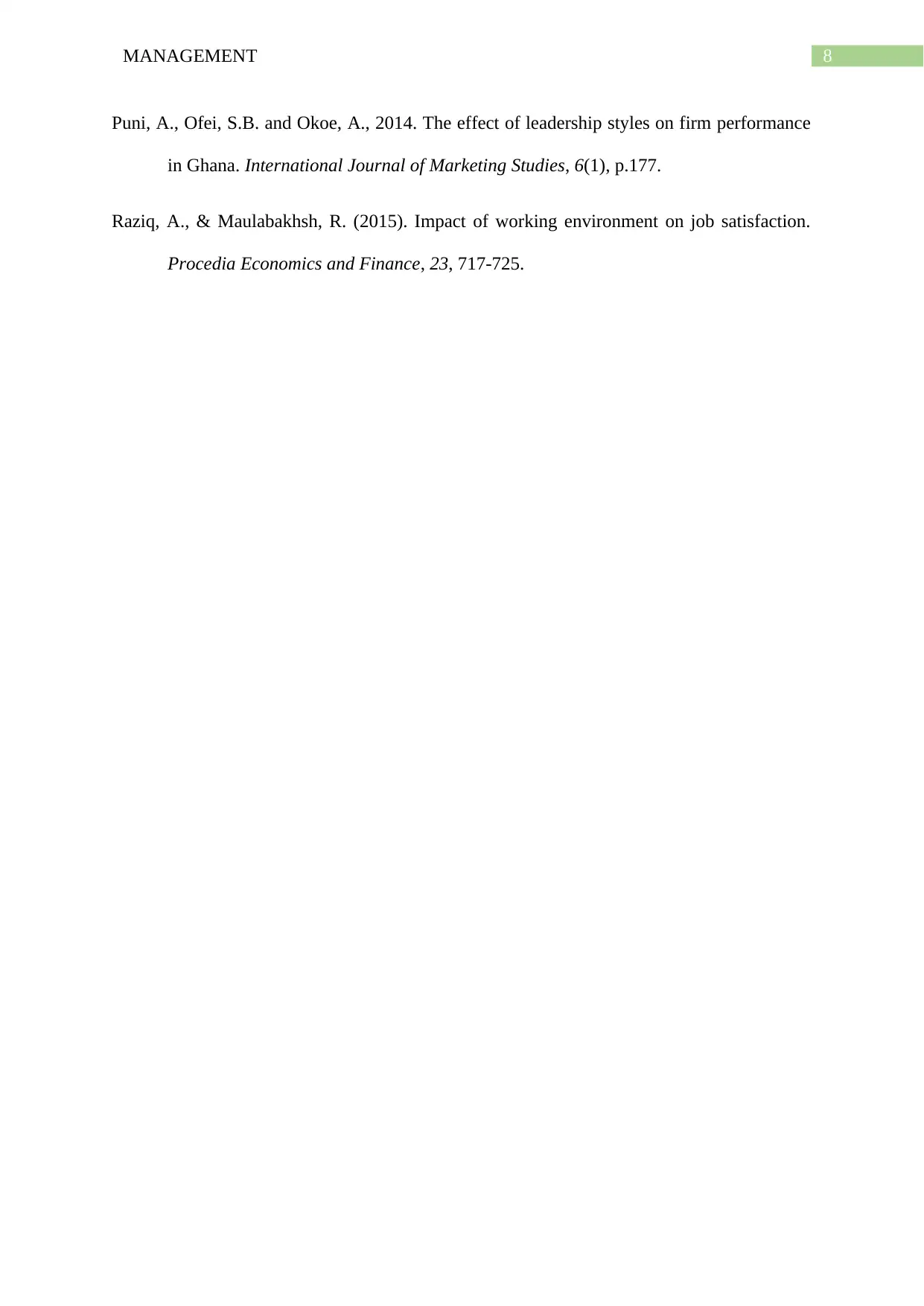
8MANAGEMENT
Puni, A., Ofei, S.B. and Okoe, A., 2014. The effect of leadership styles on firm performance
in Ghana. International Journal of Marketing Studies, 6(1), p.177.
Raziq, A., & Maulabakhsh, R. (2015). Impact of working environment on job satisfaction.
Procedia Economics and Finance, 23, 717-725.
Puni, A., Ofei, S.B. and Okoe, A., 2014. The effect of leadership styles on firm performance
in Ghana. International Journal of Marketing Studies, 6(1), p.177.
Raziq, A., & Maulabakhsh, R. (2015). Impact of working environment on job satisfaction.
Procedia Economics and Finance, 23, 717-725.
⊘ This is a preview!⊘
Do you want full access?
Subscribe today to unlock all pages.

Trusted by 1+ million students worldwide
1 out of 9
Related Documents
Your All-in-One AI-Powered Toolkit for Academic Success.
+13062052269
info@desklib.com
Available 24*7 on WhatsApp / Email
![[object Object]](/_next/static/media/star-bottom.7253800d.svg)
Unlock your academic potential
Copyright © 2020–2026 A2Z Services. All Rights Reserved. Developed and managed by ZUCOL.





